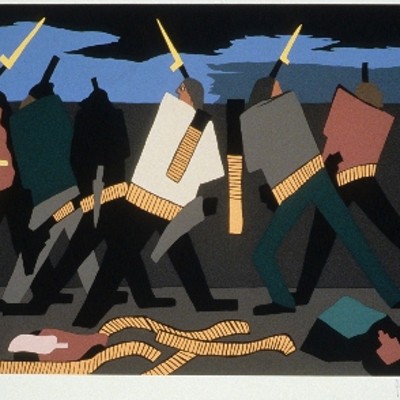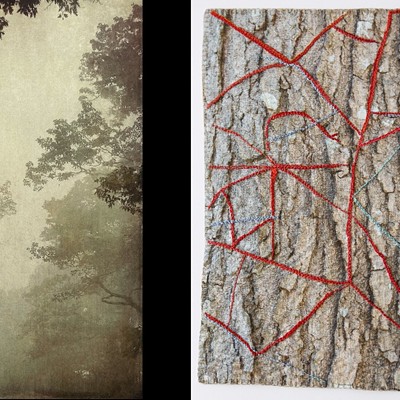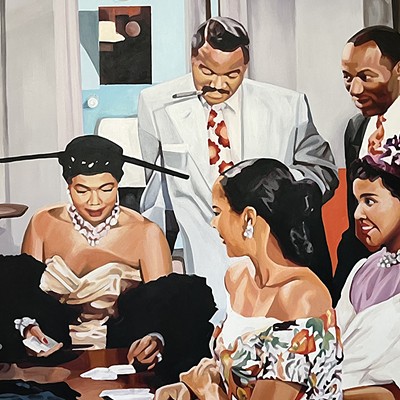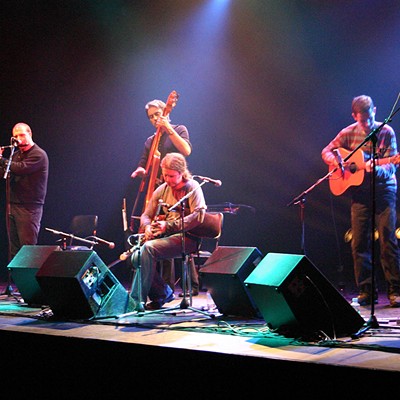Opera singers have been trilling out arias, while a director ponders correct placement on the rehearsal stage. Seamstresses have been stitching away at their machines, turning out 19th-century garments for the upcoming Arizona Opera production of La Bohème.
Puccini's tale of starving artists in Paris opens in Phoenix on Friday, Jan. 29, and in Tucson on Saturday, Feb. 6.
Arizona Opera was founded in Tucson in 1971 (its original name was the Tucson Opera Company) but for years it's been a dual-city company, maintaining its artistic production spaces in Tucson and a business office in Phoenix. But the company may soon pull up stakes and move the entire operation to the big city to the north.
"We have been looking (for a Phoenix building) for many years," says Scott Altman, the company's new general director, who hired on in October and started full-time in January. "With my arrival it's re-energizing. There's been a little more momentum of late."
On his first full week on the job, Altman met with Dwight Walth of the City of Phoenix Cultural Affairs Office to discuss building prospects. Still, Altman insists that the talks are only preliminary.
"We have no commitment to go anywhere. We have no timeline. There is a commitment," he adds, "to an extraordinary opportunity for the opera to have a building."
The City of Phoenix stands ready and willing to provide $3.25 million in bond money to buy or build a new building tailored to the opera's needs. The city would own the building, and the opera company would maintain it and run it. The new space would bring all the opera's operations under one Phoenix roof, including the rehearsal space and costume shop.
The money designated for an opera building was part of a major bond package Phoenix voters passed in 2006. The citizens OK'd $44.5 million in bonds to pay for a variety of bricks-and-mortar projects for arts and cultural facilities.
Ballet Arizona and Arizona Opera put together a joint proposal, and the voters OK'd $6.5 million to pay for a building for both nonprofits.
The idea, says Kevin Myers, executive director of Phoenix's Ballet Arizona, was "we would share a reception office and box office. Turn right and you go into the opera's spaces and turn left and you go to the ballet's."
The plan foundered during the real-estate bubble, when Phoenix prices skyrocketed.
"It was a challenge to find the right location with the right land at the right price," Myers says. "The cost of real estate went way up." Now, during the economic downturn, "land prices have begun to drop significantly. Vacancy rates are at 50 percent. It's the right time to secure a location, at a fraction of the cost."
The ballet and opera companies could still collaborate, but each would also be eligible for half the money if they can't find a suitable joint space. Walth says the bond money is "still viable" even though the economy is hurting. Bond-funded renovations on the George Washington Carver Museum and Cultural Center were recently completed; the Phoenix Museum of Art will finish a new community room within weeks.
Altman says if the opera could sell its two buildings—the Mountain Avenue space in Tucson and the business office in Phoenix—and consolidate in one building that's cost-free, it could "relieve the company of debt." Like many other arts organization, the company has suffered financially in the last year. Last June, the opera chopped $1 million out of its operating budget, employees were furloughed and at least three senior administrators departed.
In Tucson, the opera hires local singers for the chorus, actors to serve as silent supernumeraries, and costume designers, sewers and makeup artists. Dance and voice students from the UA have many opportunities to perform in the shows.
Altman says he doesn't want to alarm such workers unnecessarily, but the hard reality is that their jobs will most likely move to Phoenix.
"The people who work for us are a family," he says. "I give the staff a commitment to bend over backwards to maintain jobs. Depending on the organization's needs, there could be a possibility to offer them jobs in Phoenix."
Arizona Opera remains committed to staging shows in Tucson, Altman says, noting that if the opera company conquers its financial problems, programming could actually be strengthened.
"There will be zero effect on programming in Tucson," he says. "The effect on Tucson is literally bricks and mortar only."
But Ballet Arizona provides a cautionary example. The dance troupe also got its start in Tucson and eventually moved to Phoenix. For a while, the dancers periodically drove south down I-10 to perform ballets in Tucson. A regular season soon gave way to just one production, the annual Nutcracker, and eventually the troupe stopped dancing in Tucson at all.
"We're really a darn good incubator town," says Roberto Bedoya, executive director of the Tucson Pima Arts Council.
The news about the opera's departure came during a bad week overall for the arts in Tucson. The Tucson Symphony announced a reduced schedule for next season. And the City Council, after a slash-and-burn budget vote on Jan. 12, dismembered any number of local organizations. Access Tucson may have to close its doors (see The Skinny for details). The arts council stands to lose $157,000—or 30 percent—of its city allocation.
The council was granted $525,000 by the city for the current fiscal year, and the council voted to cut that amount by 60 percent. But the agency had already gotten—and disbursed—70 percent of that money. So the council will simply withhold the rest of the money, effectively making it a 30 percent cut.
TPAC re-grants much of its money to 53 arts organizations—including Arizona Opera—in the form of general operating grants. The groups got the first half of their allotments at the beginning of the fiscal year, and were about to get the second half shortly. Arizona Theatre Company, for example, has gotten about half of its $32,000, the largest grant given to any of the arts groups. Arizona Opera was to get $15,579 total; so far the troupe has gotten about $7,700.
Now the groups very likely will get no more money this fiscal year. Bedoya says he's still trying to figure out what the budget cuts will mean. The re-granting program is the arts council's biggest and best-known function, but TPAC also does arts marketing, stages such events as the popular Open Studios Tour and helps artists with professional development, among various other tasks.
Bedoya says he's still trying to figure out how the budget cuts will affect all these programs, and he's scheduled meetings for later this month with the TPAC board and with the grantees.
"I understand how broke the city is," he says. "We're all dealing with pain as the economy continues to shrink."
But he argues that the arts are an economic engine; the city, he says, ought to be strengthening its assets. He has recently been in discussions with the Metropolitan Tucson Convention and Visitors Bureau to promote cultural tourism. And he's just been notified that TPAC won a $200,000 grant from the Kresge Foundation, a national philanthropic organization.
Arizona Opera's Altman sympathizes with Tucson's budget woes. (The City of Phoenix has its own economic problems, the bond program notwithstanding.)
"Critical services have to be met," Altman says. "We need our police and fire."
The $7,700 shortfall in the Tucson allocation is not a lot of money for an organization with a $5 million budget, he acknowledges. And it hardly compares to the $3.25 million Phoenix is prepared to offer Arizona Opera.
But any amount of money from a city, "particularly from cities where we reside, is a stamp of approval," he explains. "It says, 'We need you in our city.'"













